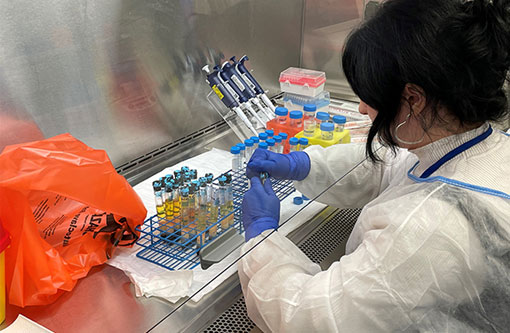Science Spotlight
Viral Immunology Branch Develops Ultra-Potent Hantavirus Antibody
Congratulations to USAMRIID's Viral Immunology Branch for their manuscript describing the development of an ultra-potent antibody to protect against multiple strains of hantavirus, a wide-ranging global disease threat. Their study appears in the June 14 issue of the journal Science Translational Medicine.
In collaboration with the Albert Einstein College of Medicine (AECOM) in New York, the USAMRIID team was first to demonstrate protective efficacy in animal models where virus was both present in the bloodstream and highly concentrated in the lungs. In addition, they developed strategies to improve potency of the lead candidate, while also defining the mechanism of action for "broad-spectrum" neutralizing antibodies.
This study builds on previous research in which the same team discovered the first human antibody to effectively neutralize two types of hantaviruses in animal models. Work continues to develop this promising candidate into a "pan-hantavirus" therapy that could protect against outbreaks caused by multiple types of known or emerging hantaviruses.
Collectively, hantaviruses cause about 50,000 severe and often fatal infections worldwide in people each year. While humans are typically infected by contact with rodents, the viruses also can be transmitted by direct person-to-person contact, and no approved therapies are currently available for treating hantavirus infection.
Rodent-borne hantaviruses are grouped into two distinct viral families, commonly called "Old World" and "New World" hantaviruses, and cause two types of disease. Hemorrhagic fever with renal syndrome (HFRS) is caused by Old World viruses found mostly in Europe and Asia, while New World viruses cause hantavirus cardiopulmonary syndrome (HCPS) and are typically found in North and South America. Both pose a risk to U.S. troops who may be stationed in parts of the world where these viruses are endemic.
Funding for the research comes from the National Institute of Allergy and Infectious Diseases, National Institutes of Health, under a grant to the Prometheus consortium. Led by AECOM, the consortium includes USAMRIID and institutions from seven countries in the Americas, Europe, and Africa, as well as from academia, government, and industry. The group's aim is to develop antibody-based therapies against lethal viruses that commonly spread from animals to people.
 An official website of the United States government
An official website of the United States government
 ) or https:// means you've safely connected to the .mil website. Share sensitive information only on official, secure websites.
) or https:// means you've safely connected to the .mil website. Share sensitive information only on official, secure websites.

